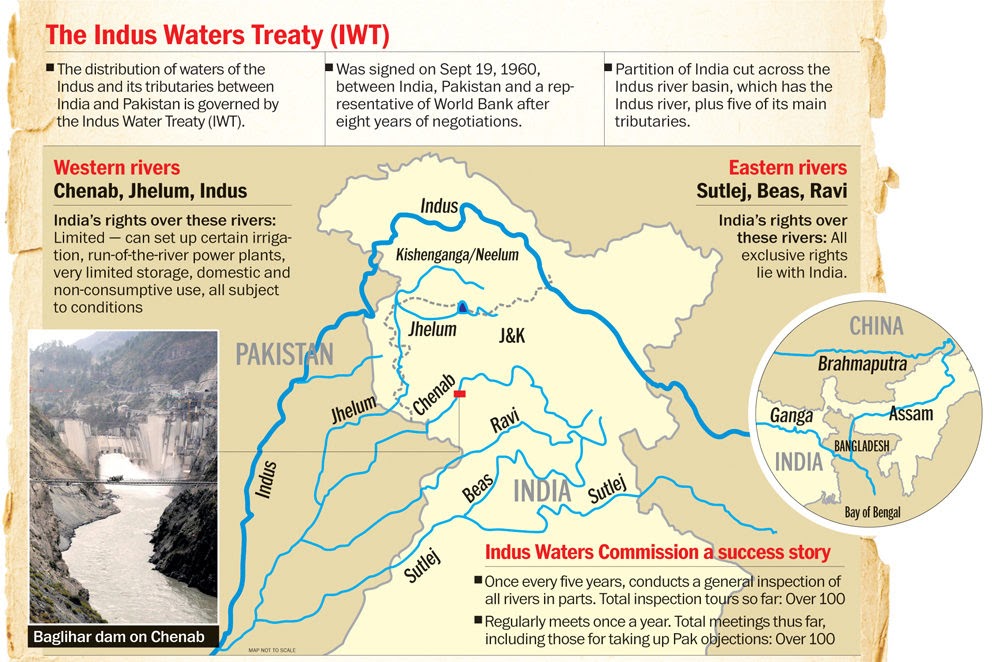Ahmedabad
(Head Office)Address : 506, 3rd EYE THREE (III), Opp. Induben Khakhrawala, Girish Cold Drink Cross Road, CG Road, Navrangpura, Ahmedabad, 380009.
Mobile : 8469231587 / 9586028957
Telephone : 079-40098991
E-mail: dics.upsc@gmail.com

Indus Water Treaty
News: New Delhi has issued a notice to Islamabad seeking modification of the more than six-decade-old Indus Waters Treaty (IWT) that governs the sharing of waters of six rivers in the Indus system between the two countries.
Background:
• The notice appears to be a fallout of a longstanding dispute over two hydroelectric power projects that India is constructing – one on the Kishanganga river, a tributary of Jhelum, and the other on the Chenab (Ratle Hydroelectric project).
• In 2015, Pakistan asked that a Neutral Expert should be appointed to examine its technical objections to the Kishanganga and Ratle HEPs. But the following year, Pakistan unilaterally retracted this request, and proposed that a Court of Arbitration should adjudicate on its objections.
What is the Indus Water Treaty (IWT)?
• IWT is a water-distribution treaty between India and Pakistan, brokered by the World Bank (WB), to use the water available in the Indus River and its tributaries. It was signed in Karachi in 1960 by then-Indian PM Jawaharlal Nehru and then-Pakistani president Ayub Khan.
• The Treaty gives control over the waters of the three “eastern rivers” – the Beas, Ravi and Sutlej (BRS)- to India, while control over the waters of the three “western rivers” – the Indus, Chenab and Jhelum -has been given to Pakistan.
• India has about 20% of the total water carried by the Indus system while Pakistan has 80%.
• The treaty allows India to use the western river waters for limited irrigation use and unlimited non-consumptive use for such applications as power generation.
• India has the right to generate hydroelectricity through run-of-the-river (RoR) projects on the western rivers which, subject to specific criteria for design and operation, is unrestricted.
• The dispute redressal mechanism provided under the IWT is a graded 3-level mechanism.
• Under the IWT, whenever India plans to start a project, it has to inform Pakistan. The concerns have to be cleared at the levels of the Indus Commissioners → Neutral Expert → Court of Arbitration, in a graded manner.
What are the main concerns at the moment?
• Pakistan’s refusal to discuss on issues and find mutually agreeable solutions during the course of Regular meetings of Indus Water Commissioners since 2017.
• The World Bank’s decision (March 2022) to resume the process of appointing a Neutral Expert and a Chairman for the Court of Arbitration. India believes that such parallel consideration of same issues is not provided for in any provisions of the Treaty, and India has been repeatedly citing the possibility of the two processes delivering contradictory rulings, which could lead to an unprecedented and legally untenable situation, which is unforeseen in Treaty provisions.
What is India’s notice and what are its possible implications?
• First, it seeks to address the issue of two parallel mechanisms.
• Article XII (3) of the Treaty that India has invoked is not a dispute redressal mechanism. It is in effect, a provision to amend the Treaty.
• However, an amendment or modification can happen only through a “duly ratified Treaty concluded for that purpose between the two governments”. Pakistan is under no obligation to agree to India’s proposal.
• As of now, it is not clear what happens if Pakistan does not respond to India’s notice within the 90-day period.
• The next provision in the Treaty, Article XII (4), provides for the termination of the Treaty through a similar process — “a duly ratified Treaty concluded for that purpose between the two governments”.
IWT as a strategic tool?
• While India may not have spelled out exactly what it wants to be modified in the Treaty but since Uri Attack at Pak’s behest, there has been a growing demand in India to use the IWT as a strategic tool.
How has India utilized its right over river waters?
• We have not fully utilized our rights of waters in three-east flowing rivers over which we have full control. Also, we have not adequately utilized the limited rights over three West flowing rivers which are meant for Pakistan.
We recommend you to watch our You Tube content on IWT by clicking on this link https://youtu.be/yp1Ql5_fic8

Address : 506, 3rd EYE THREE (III), Opp. Induben Khakhrawala, Girish Cold Drink Cross Road, CG Road, Navrangpura, Ahmedabad, 380009.
Mobile : 8469231587 / 9586028957
Telephone : 079-40098991
E-mail: dics.upsc@gmail.com
Address: A-306, The Landmark, Urjanagar-1, Opp. Spicy Street, Kudasan – Por Road, Kudasan, Gandhinagar – 382421
Mobile : 9723832444 / 9723932444
E-mail: dics.gnagar@gmail.com
Address: 2nd Floor, 9 Shivali Society, L&T Circle, opp. Ratri Bazar, Karelibaugh, Vadodara, 390018
Mobile : 9725692037 / 9725692054
E-mail: dics.vadodara@gmail.com
Address: 403, Raj Victoria, Opp. Pal Walkway, Near Galaxy Circle, Pal, Surat-394510
Mobile : 8401031583 / 8401031587
E-mail: dics.surat@gmail.com
Address: 303,305 K 158 Complex Above Magson, Sindhubhavan Road Ahmedabad-380059
Mobile : 9974751177 / 8469231587
E-mail: dicssbr@gmail.com
Address: 57/17, 2nd Floor, Old Rajinder Nagar Market, Bada Bazaar Marg, Delhi-60
Mobile : 9104830862 / 9104830865
E-mail: dics.newdelhi@gmail.com